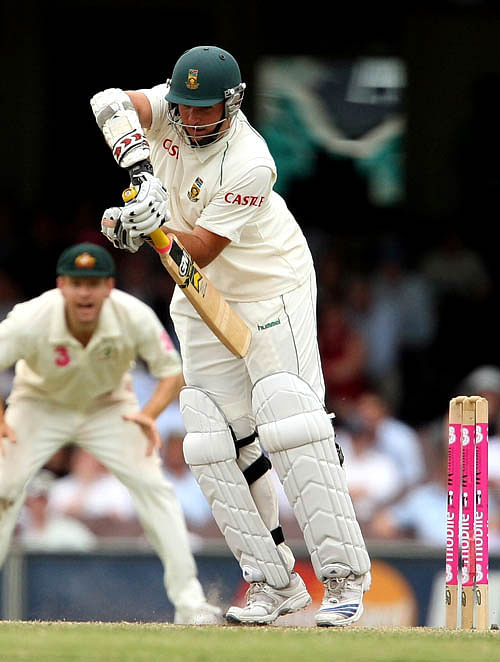
The Odyssey of Graeme Smith

Graeme Smith displayed grit and ruthlessness in his leadership
Sport has this uncanny ability to make fantasy look veracious. Even the great Nostradamus would have not prophesied this a decade ago. Did you guys predict this? I definitely did not. Let us roll back the clock.
Cricket’s biggest extravaganza “The ICC Cricket World Cup 2003” was held in the rainbow nation for the first time. A nonchalant mathematical error knocked the Proteas out of the World Cup in their own backyard. They added credence to their tag of “Chokers” and were left to lick their wounds.
Lambasted, rebuked and derided by the media, senior statesman Shaun Pollock relinquished his throne. The South African cricket team was in a state of turmoil and it yearned for a leader to resurrect them. After enough scrutiny, the wise men of South African cricket board appointed Graeme Craig Smith, a man who was just 8 Tests old, to handle the mantle of captaincy.
An early start

At 22, leading the national team is not a bed of roses
A tall and a sturdy left-handed batsman who was thrown into the cauldron of Test cricket merely a year ago, was now at the helm of the South African cricket team. Cricket pundits criticised this as being a preposterous decision as Smith had shown ‘few leadership credentials’.
At an age of 22 when cricketers struggle to keep their feet on the ground, Smith had the arduous job of leading his side against the best in the business. He was callow to the art of captaincy but he had the resolve to learn and the vision to script history.
His partnership with Herschelle Gibbs was prolific and the duo went from strength to strength by pulverising bowling attacks. Leg side was his bastion as he carted balls from outside off to the on side with consummate ease. His calm demeanour, unremitting attitude and brash strokes took the opposition off guard, as he asserted his supremacy over his peers. These qualities were on display on his first tour of England where he amassed double centuries in consecutive Test matches on the English soil.
His journey has been no bed of roses. He had to endure tough loses, which he did with poise and aplomb. He neither dropped his guard with the media nor tried to find a litany of excuses which captains often tend to do. “Defeat has a dignity which noisy victory does not deserve,” said Argentinean poet Jose Luis Borges. The man from Johannesburg understood this better than anyone else.
The greatest ODI ever played

Graeme Smith gave a brilliant start to a world record ODI chase
The eventful day of March 12, 2006 would turn out to be a peripeteia in the history of one day cricket. Ricky Ponting’s men dismantled the Proteas and set them a target of 435 which seemed insuperable. But what followed was jaw-dropping cricket that took one’s breath away.
Smith and Gibbs came up with an array of strokes that redefined the dimensions of batsmanship. Smith scored a blitzkrieg 90 (of 55 balls) that set the ball rolling. It was an innings that altered the course of history and one that deserves far more credit. Chasing 435 in a one day game were in the realms of the impossible but Smith’s men just walked past it with great panache.
The metamorphosis of a rustic young lad annealing himself to lead his cohorts has defined the career of Smith. This has led me to draw a cricketing comparison that was never thought possible ten years before. Graeme Smith’s odyssey as a captain has resembled much with a yesteryear great – Stephen Fleming. Both were made captains at a young age, when their respective teams were in disarray. They were raw to the ordeal at hand but with time, acclimatised to become the Zen Masters.
The gritty leader
“Leading from the front” is a quotidian cliché which captains strive to pursue. But behemoth ‘Biff’ was no ordinary captain, instead he led by example.
One of the images that left an indelible impression on cricket fans around the world is that of a gladiator rising from the dead with a broken hand and an injured elbow, walking out to bat at the SCG to salvage a draw for his country.
Battling pain and the Aussie pacers with stoic determination, he almost saved the match when a Mitchell Johnson’s inswinger disrupted his woodwork. The Proteas lost the Test but Smith had won the hearts of a legion of cricket fans around the globe.

Graeme Smith’s heroic effort in Sydney is a part of folklore now
Smith wielded the willow with flamboyance and fierce determination that only few possess in the game. His batting exploits on English soil in the summer of 2003 wrecked havoc in the English camp and led to subsequent resignation of captaincy by Nasser Hussain.
Graeme has a unique distinction of toppling three English captains in his three visits to England. He had the ability to produce the goods when the chips were down and revelled batting in the fourth innings which was a nightmare even for the game’s finest batsmen. The gallant knocks at Edgbaston (148) and the WACA (108) were his finest with the latter setting the platform for a mammoth chase of 434.
The legacy of Graeme Smith
His success as a skipper has transcended his performance as a batsman. His appetite to win Test series abroad was insatiable. Taming the Aussies on their own soil for the first time in sixteen years and usurping the English atop of the rankings in the hardest form of the game were crowning achievements which further embellished a decorated career.
The shortcomings of the Proteas at the world cups continued even under his astute leadership and it seems to be the one and only blemish of an awe-inspiring reign for over a decade. The impotence of the Saffers to win a knockout match in the world cup for the past 22 years seems to be a curious conundrum which is now left for AB de Villiers to solve.
In the modern era where captains have an ephemeral lifespan, his eternal existence at the pinnacle of his sport will be his greatest badge of honour. Allying indomitable courage with cricketing acumen he led his side on 104 occasions (Won 51, lost 27, Drawn 26) managing to win every alternate game. It is a phenomenal record which is bound to stand the test of time and it would define the legacy of Smith in the years to come.
At 33, Smith’s body is ready for yet another odyssey, but a young family and an ailing daughter have managed to knock him out which his adversaries could not do.
He has been venturesome on this adventurous journey and has shown his men the way ahead. In around 11 months from now the Proteas will stage their play down under without their protagonist. In the end, when the history books are rewritten, there will be an indubitable truth – this was a tale of a young man who shred off the boy in him to script his own legacy.